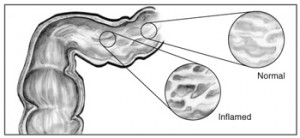“Secret Life” Actor Ken Baumann Diagnosed With Crohn’s Disease

As Benjamin “Ben” Boykewich, an idealistic seventeen-year-old on ABC Family’s The Secret Life of the American Teenager, Ken Baumann has to deal with typical issues of teenage angst.
But in real life, the 22-year-old actor is battling a much more serious problem. He was recently been diagnosed with Crohn’s Disease, an inflammatory condition of the digestive tract, in the same group of disorders as ulcerative colitits.
While preparing for his June wedding to Superbad actress Aviva Farber, Baumann began to experience intense abdominal and leg pain. Physicians found a abscess in his leg and a tear in his intestines, which required surgery. After the surgery, Baumann was a “terrifying skinny” 108 lbs!
But Baumann has regained the weight and now says he has the disease under control.
Last week, went to Good Morning America to talk about it. ABC News’ Nick Watt asked Baumann why he wanted to discuss his condition.
Well, I was thinking about the 14-year-old fan of the show. Going through the pain and not knowing what it is…
Good for you Ken!
What is Crohn’s disease?
 Crohn’s disease is an ongoing disorder that causes inflammation of the digestive tract, also referred to as the gastrointestinal (GI) tract. Crohn’s disease can affect any area of the GI tract, from the mouth to the anus, but it most commonly affects the lower part of the small intestine, called the ileum. The swelling extends deep into the lining of the affected organ. The swelling can cause pain and can make the intestines empty frequently, resulting in diarrhea.
Crohn’s disease is an ongoing disorder that causes inflammation of the digestive tract, also referred to as the gastrointestinal (GI) tract. Crohn’s disease can affect any area of the GI tract, from the mouth to the anus, but it most commonly affects the lower part of the small intestine, called the ileum. The swelling extends deep into the lining of the affected organ. The swelling can cause pain and can make the intestines empty frequently, resulting in diarrhea.
Crohn’s disease is an inflammatory bowel disease, the general name for diseases that cause swelling in the intestines. Because the symptoms of Crohn’s disease are similar to other intestinal disorders, such as irritable bowel syndrome and ulcerative colitis, it can be difficult to diagnose. Ulcerative colitis causes inflammation and ulcers in the top layer of the lining of the large intestine. In Crohn’s disease, all layers of the intestine may be involved, and normal healthy bowel can be found between sections of diseased bowel.
Who gets Crohn’s disease?
Crohn’s disease can run in families. As many as 20 percent of people with Crohn’s disease have a relative with Crohn’s disease or another inflammatory bowel disease. It is most common in people between the ages of 20 and 30. Both men and women can have Crohn’s disease.
What are the symptoms?
 The most common symptoms of Crohn’s disease are abdominal pain, often in the lower right area, and diarrhea. Rectal bleeding, weight loss, arthritis, skin problems, and fever may also occur. Bleeding may be serious and persistent, leading to anemia. Children with Crohn’s disease may suffer delayed development and stunted growth. The range and severity of symptoms varies.
The most common symptoms of Crohn’s disease are abdominal pain, often in the lower right area, and diarrhea. Rectal bleeding, weight loss, arthritis, skin problems, and fever may also occur. Bleeding may be serious and persistent, leading to anemia. Children with Crohn’s disease may suffer delayed development and stunted growth. The range and severity of symptoms varies.
What are the complications of Crohn’s disease?
The most common complication is blockage of the intestine. Blockage occurs because the disease tends to thicken the intestinal wall with swelling and scar tissue, narrowing the passage. Crohn’s disease may also cause sores, or ulcers, that tunnel through the affected area into surrounding tissues, such as the bladder, vagina, or skin. The areas around the anus and rectum are often involved.
The tunnels, called fistulas, are a common complication and often become infected. Sometimes fistulas can be treated with medicine, but in some cases they may require surgery. In addition to fistulas, small tears called fissures may develop in the lining of the mucus membrane of the anus.
Nutritional complications are common in Crohn’s disease. Deficiencies of proteins, calories, and vitamins are well documented. These deficiencies may be caused by inadequate dietary intake, intestinal loss of protein, or poor absorption, also referred to as malabsorption.
Other complications associated with Crohn’s disease include arthritis, skin problems, inflammation in the eyes or mouth, kidney stones, gallstones, or other diseases of the liver and biliary system. Some of these problems resolve during treatment for disease in the digestive system, but some must be treated separately.
What is the treatment for Crohn’s disease?
Treatment may include drugs, nutrition supplements, surgery, or a combination of these options. The goals of treatment are to control inflammation, correct nutritional deficiencies, and relieve symptoms like abdominal pain, diarrhea, and rectal bleeding.
At this time, treatment can help control the disease by lowering the number of times a person experiences a recurrence, but there is no cure. Treatment for Crohn’s disease depends on the location and severity of disease, complications, and the person’s response to previous medical treatments when treated for recurring symptoms.
Some people have long periods of remission, sometimes years, when they are free of symptoms. However, the disease usually recurs at various times over a person’s lifetime.
Someone with Crohn’s disease may need medical care for a long time, with regular doctor visits to monitor the condition.
Click here to see other celebrities with Crohn’s Disease.
For more information about Crohn’s Disease, click here to go to the Resounding Health Casebook on the topic.



























3 Comments